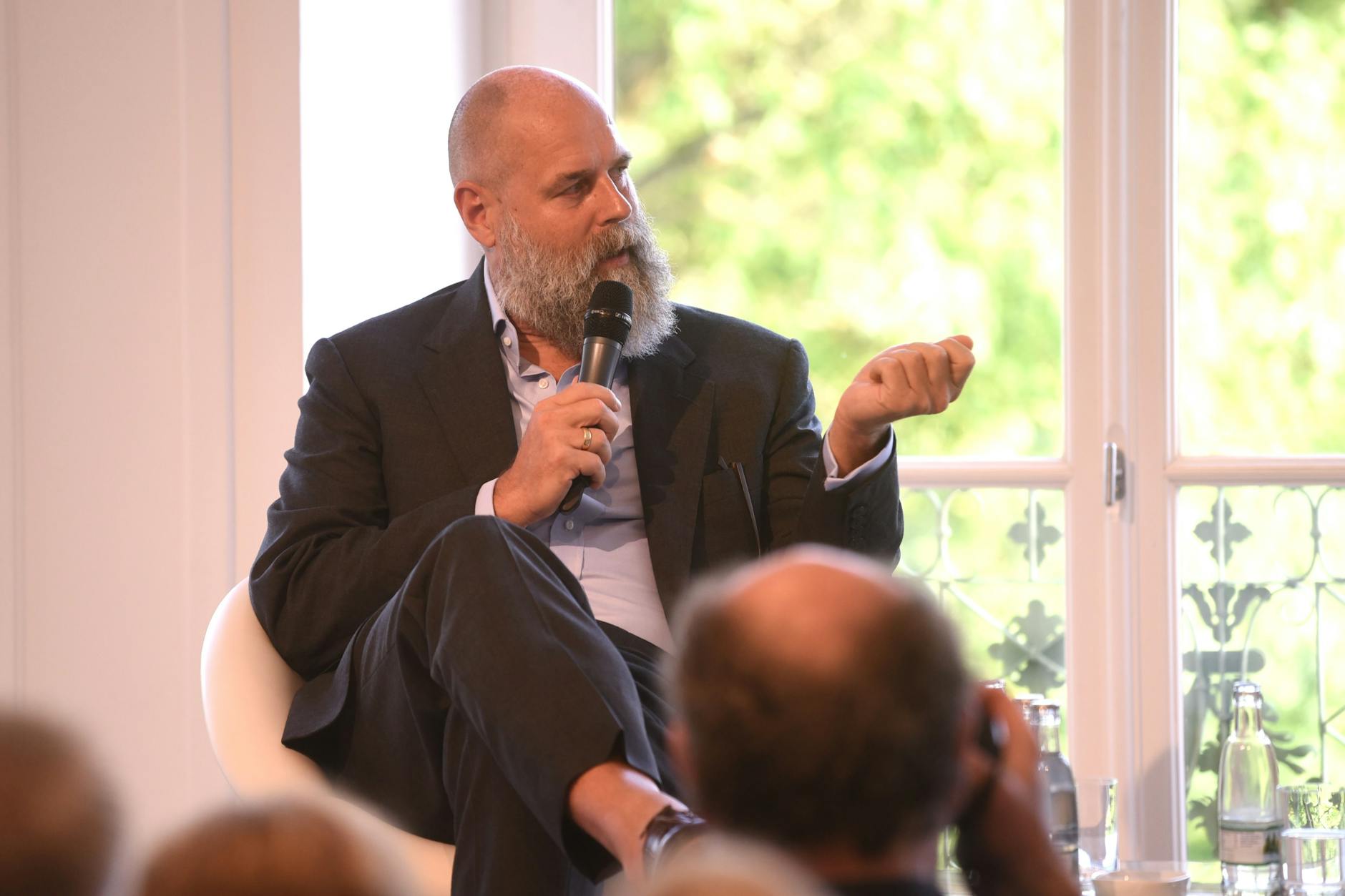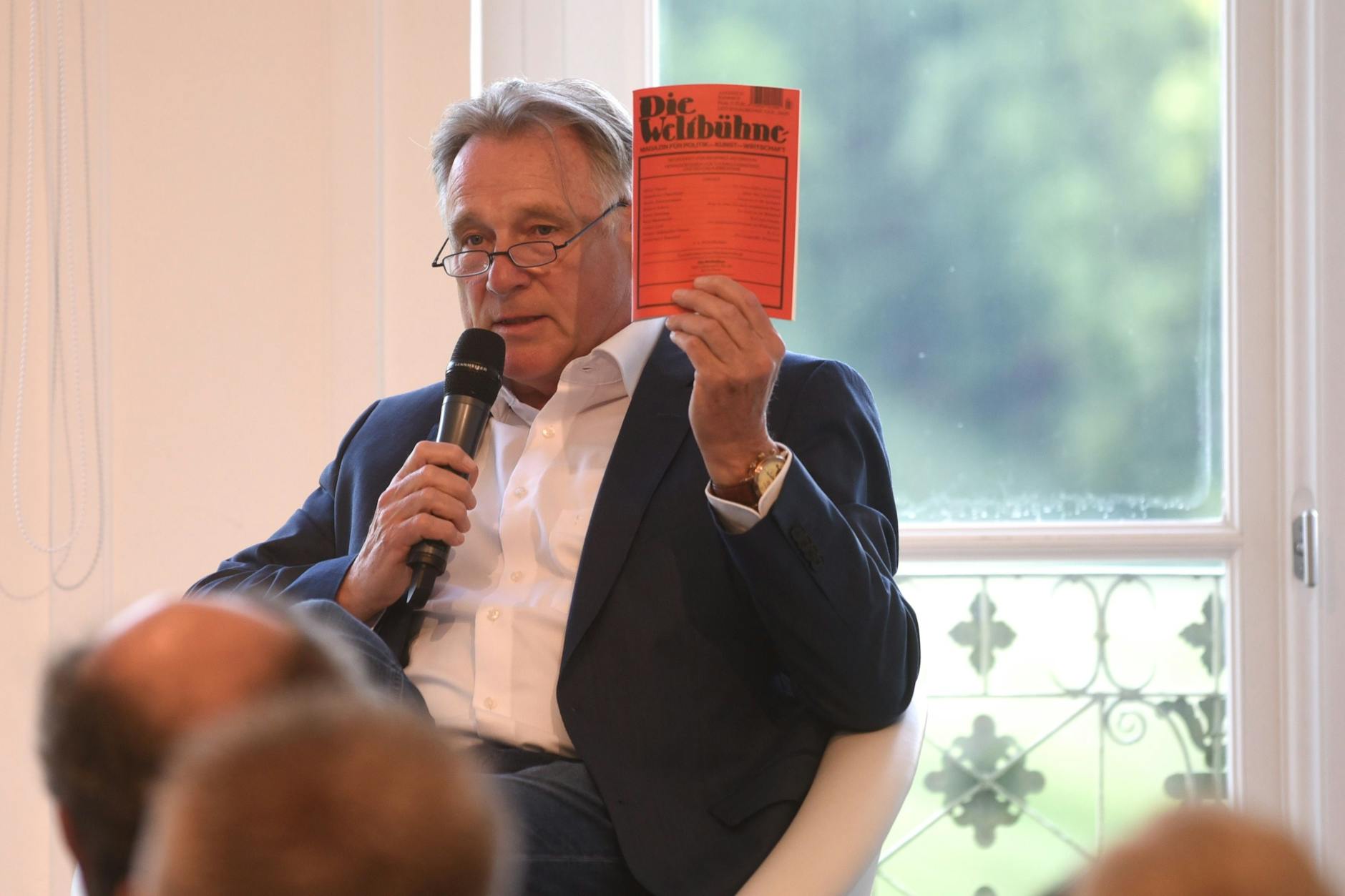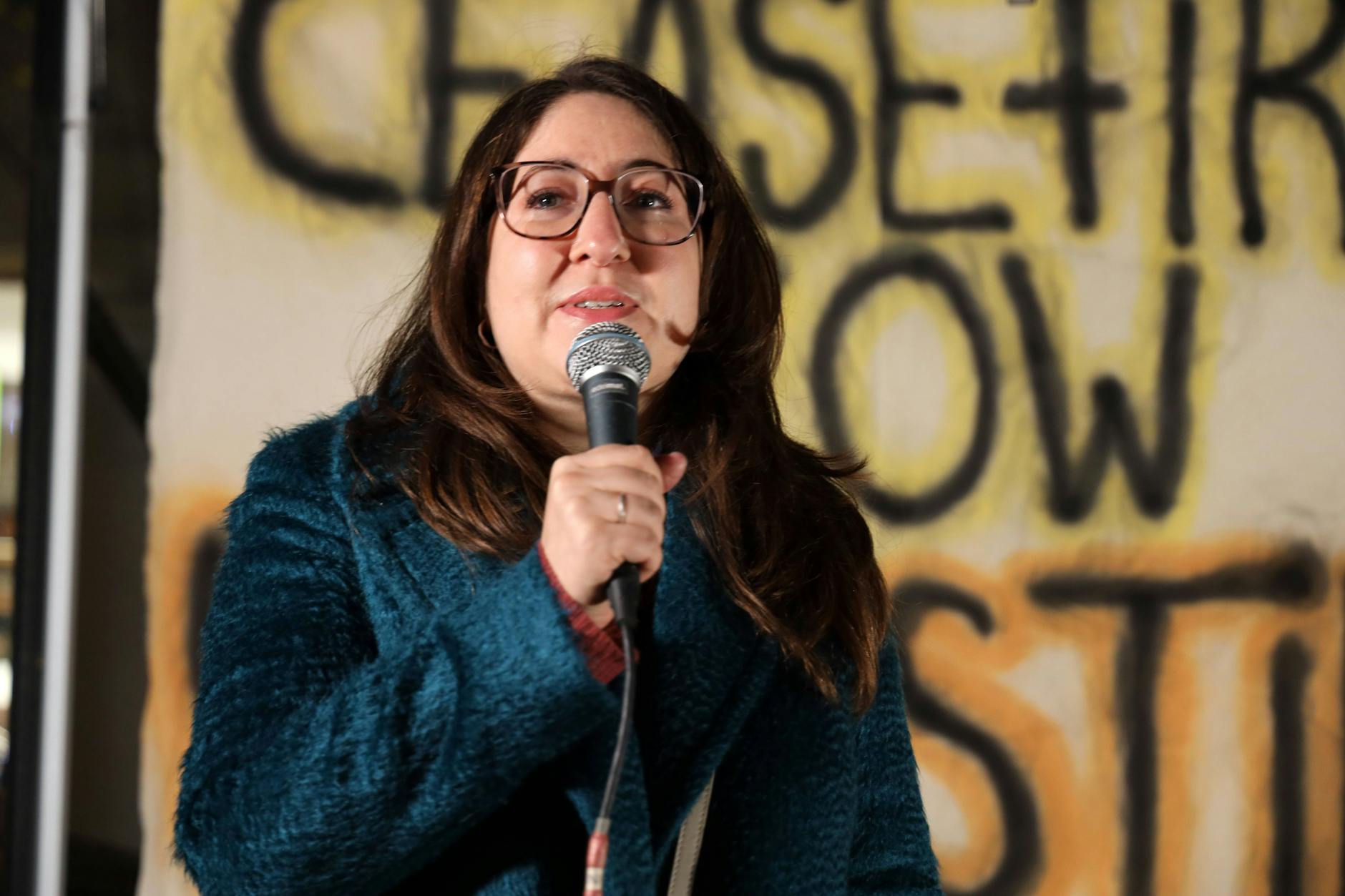Holger Friedrich: Why I continue to fight for freedom

The publisher has been denounced with every possible denunciation: Putin's servant, coronavirus denier, anti-Semite. Here he writes why he continues to fight.
Since purchasing the Berliner Verlag, I've learned a great deal about media as a tool of power. I've experienced the impact statements and actions have when they have the reach of a medium. I've also learned what it feels like to trigger the resentment of an established system when its orthodoxies are questioned and exclusive access to that system is opened. Immediately after acquiring the publishing house in 2019, the industry and the public still greeted me and my family with cautious curiosity. However, this curiosity soon turned to rejection when we signaled that we would not continue "business as usual." We wanted to level power imbalances, provide more comprehensive information, provide access to the unfairly marginalized, and shift opinion-forming to the readers' side. To enable freedom of the press in the best sense. We wanted to help reduce the growing gap between experienced and published reality.
It didn't take much for the conflict that soon developed. All it took were the internal disputes inevitable in any period of change and a long article in which we attempted to explain what we stand for and how we intend to tackle the challenges ahead. Shortly thereafter, some colleagues in the editorial offices of our competitors seemed to have come to the conclusion: Someone like Friedrich shouldn't be allowed to own a newspaper.
What followed was the first large-scale discrediting campaign. Christian Meyer and Uwe Müller from Die Welt believed they had uncovered that I had something to do with the Stasi; that I had been cornered by the Stasi as a teenager, and that I felt compelled to give lip service to cooperation. This fact was no secret. The Stasi had been interested in me since I was 16; the surveillance ended when I turned 23, just a few days before the fall of the Berlin Wall. Many people around me knew the stories. Thus, there were two files: a larger "victim file" with hundreds of pages, compiled over a period of more than six years, and a "perpetrator file" with approximately 120 pages over a year and a half. As an informant, I had to attend four conspiratorial meetings from June to August 1988. In the summer of 1988, I refused further cooperation with the Stasi and further denied myself to those around me. Incidentally, the escalating episode took place during my military service. According to the Stasi Records Act, any use of the files by the press would have been completely illegal. The newspaper Die Welt had access to a mere 80 pages of the "perpetrator file." Even in this excerpt, it was still easy to discern that a gradual escalation between the Stasi investigators and me led to my involuntary cooperation with the Stasi, and that I simultaneously successfully stifled this cooperation—something that several people mentioned in the file later confirmed to Zeit, Frankfurter Allgemeine Zeitung, Spiegel, and even the New York Times. This was also confirmed by the report of an independent commission. Deutschlandfunk reported under the headline "Stasi report exonerates Holger Friedrich": "Friedrich was monitored by 16 people while on vacation with his girlfriend in 1987. Later, the Stasi gained access to his apartment with a duplicate key to copy material. This could explain why Friedrich, during the 'contact phase,' endeavored to meet the Stasi's demands for unofficial cooperation."
But Die Welt wanted a different story. Many media outlets picked up the story without verifying it themselves. After its initial publication on a Friday evening, almost all German newspapers ran a report on the "Stasi story of the new publisher of the Berliner Zeitung" the following Saturday morning. However, the way it was reported in the media, and as it appears today on Wikipedia, alongside other untruths, is not true. If Wikipedia followed its own standards, it would have to suspend publication of the page.

The unjustified label of "Stasi publisher" is still used as a slur today, if no argument can be found. The findings of the independent commission are not in the interest of those who wanted to make the accusation against me, nor would it have been consistent with their story.
That this isn't a singular pattern that only affects me is demonstrated by similar moments of media failure. Each of us knows at least three stories in which the protagonists were severely damaged by the actions of the press. My three cases are Thomas Oberender by RBB, Jörg Schönbohm by Jan Böhmermann and ZDF, and the unspeakable and still uncorrected reporting by MDR about a fabricated murder of an East German contract worker, the Diogo case. This was reviewed by my colleague Anja Reich in the Berliner Zeitung.
In my case, one discrediting followed another. When we questioned individual measures during the coronavirus pandemic, such as school closures, mandatory mask wearing outdoors, or mandatory vaccination, we were accused of denying the virus. Today, there is a consensus that many measures were ineffective and, in some cases, even caused lasting damage. When I spoke with Hungarian Prime Minister Viktor Orbán, I was accused of not giving him a platform, and that there was nothing to be learned from such a conversation anyway. Orbán's central and outrageous message from that conversation, that Russia's war of aggression against Ukraine could only be resolved between Russia and the United States, is now considered common sense. When we reported from China that developments there were threatening the core of our economic base, there was an outcry and accusations of glorifying collective models of society. Today we see the devastation in the balance sheets of German automobile companies, whose sales in China have collapsed and who are facing innovative Chinese competition in global markets.When we tried to explore, not excuse, the context of Russian aggression against Ukraine, we were accused of being Putin sympathizers and spreading Kremlin narratives. Now, our predictions are being confirmed by bitter reality.
Disturbing memoriesToday, after acquiring the rights to Weltbühne, I find myself in a similar situation. Nicholas Jacobsohn, grandson of Weltbühne founder Siegfried Jacobsohn, accuses me of dishonestly depriving him of his inheritance. That this is untrue is easily proven and will be demonstrated shortly in the Berliner Zeitung. At the same time, an article in the first issue of the new Weltbühne edition is causing a stir. In it, Deborah Feldman asks why Philipp Peyman Engel, editor-in-chief of the Jüdische Allgemeine, underexposed essential parts of his biography. What I didn't expect is that, in addition to all the above, I am now also being accused of being anti-Semitic. This approach is disturbingly reminiscent of what I experienced after acquiring Berliner Verlag.
The taz newspaper presented the information on Saturday. It refers to a statement I made during a conversation at Ettersberg Castle, in which I expressed my delight that, after initial attempts at constructive cooperation, I had finally prevailed in the struggle for Weltbühne's trademark rights as an " East German" against the " East Coast moneyed aristocracy." "East Coast moneyed aristocracy" could be interpreted as an anti-Semitic code word. For me, it was a geographical location of my opponent's center of life. He lives on the US East Coast in Boston. And as a stock trader, he should belong to the upper income bracket in the hierarchy of the financial market industry.
On Friday, the Jüdische Allgemeine sent me a request for a statement regarding the taz article, presumably to reinforce the “anti-Semite” point.

I informed the Jüdische Allgemeine that I strongly reject the infamous accusation of anti-Semitism. Regarding the term "East Coast," I referred to the American historian George Dyson and his book "Turing's Cathedral" and the British historian Frances Stonor Saunders. Saunders describes the "so-called East Coast aristocracy" in conjunction with the "Ivy League" as "a kind of brotherhood of Anglophile educated citizens who saw the justification for their actions anchored in the traditions of the Enlightenment and the Declaration of Independence." From this, he stated, the "Park Avenue Cowboys" developed, a "network" with influence "in America's boardrooms, academic institutions, major newspapers and other media outlets, law firms, and the government itself." I stand firmly—not only, but also confirmed by the reporting of the Berliner Zeitung—for the protection of Jewish life and Jewish culture and find it deeply regrettable that both are still and increasingly in need of protection in Germany. More progress has been made in other countries.
It's equally true that I don't admire autocrats. That I in no way support the idea of transforming Germany into an autocracy or a Bismarckian nation-state. That I am a friend of Russia, but reject every imperial reflex there. In the same way that I enjoy being in New York, on the East Coast, and reject outdated patterns of imperial US policy, I can appreciate progress in Beijing without any feeling of disturbance, yet still know that the degree of my individuality, my insistence on fundamental civil rights, would lead to difficulties there.
Declining trust in the mediaThe tendency observed in politics and the media in recent years to resort to medieval methods of exclusion to maintain power cannot be productive in modern societies. The pillorying in the media marketplace, catering to the baser urges of the jeering or shamefully lascivious public, shames our age, especially and even more so its media elites. Quite a few media outlets shy away from discourse and open debate, entrenching themselves behind terms like coronavirus denier, conspiracy theorist, Putin supporter, enemy of democracy, left-wing, right-wing, controversial, or anti-Semite as a marker for asserting their own interests. In my case, it will not lead me and the teams at Berliner Verlag to abandon our goals. The successes of the Berliner Zeitung and now the Weltbühne demonstrate this. However, the consequences are demonstrated by surveys on declining trust in the media and the increasingly perceived restrictions on freedom of expression.
Current developments demonstrate how necessary this is, even in times when a text by Maxim Biller, certainly worthy of discussion, is being deleted rather than engaging in the debate. The world is changing, and with it some German certainties. It takes strength and courage to face the debate, and it's so much easier to avoid it with polemics.

The background to the planned article against me in the Jüdische Allgemeine lies more in a conflict between the newspaper's editor-in-chief, Philipp Peyman Engel, and the Weltbühne: The author Deborah Feldman had pointed out double standards in an article for the magazine's first issue . Peyman Engel had polemically attacked a journalist who had claimed to be Jewish, was not, and publicly admitted this. The journalist had attracted attention through articles critical of Israel. Feldman uncovered gaps in Peyman Engel's biography and wanted answers from Peyman Engel. She wanted to know whether one could instrumentalize a person's origins if one dislikes their political views. Peyman Engel did not want to comment - neither for the research nor for an enlightening background discussion. I personally spoke as a mediator in this Jewish-Jewish discourse – Peyman Engel declined. And speaking of Weltbühne: Nicholas Jacobsohn, the grandson of Weltbühne publisher Siegfried Jacobsohn, is using media power to position himself as the late victim of the expropriation of the intangible heritage. He and his family were offered the opportunity to revive Weltbühne as a cultural asset more than once. His family had several opportunities, and he himself had the opportunity in the spring of 2025, to dedicate himself to this important cultural heritage. Four weeks before the reprint was launched, I sent him a final message, writing him a personal letter, in which I reaffirmed the offers of cooperation I had made several times previously. As a capital market player, he should know the rules of a free market economy. The fact is: The Weltbühne rights, previously held on the US East Coast in Boston, are now in East Berlin, in Mitte at Alexanderplatz, and the focus is on the resurrection of the Weltbühne debate platform, which continues the legacy of non-violent, eloquent debate culture in Germany. Returning to the state of the media in Germany, this is more than necessary. Thanks to the two editors, Behzad Karim Khani and Thomas Fasbender, Weltbühne has matured into another platform for learning and non-violent exchange. Subscribers now come from eight European countries, which shows that the demand extends far beyond Germany. Mr. Jacobsohn is also welcome to contribute. As with all titles from the Berlin publisher, the doors are wide open to everyone via open source. As long as the universal values of a civilized world are taken into account. We should recognize that competition according to fair rules leads to better results. And if we don't do this, even more people will orient themselves towards the edges of the spectrum.Don't shoot the messenger.
Do you have feedback? Write to us! [email protected]
Berliner-zeitung




